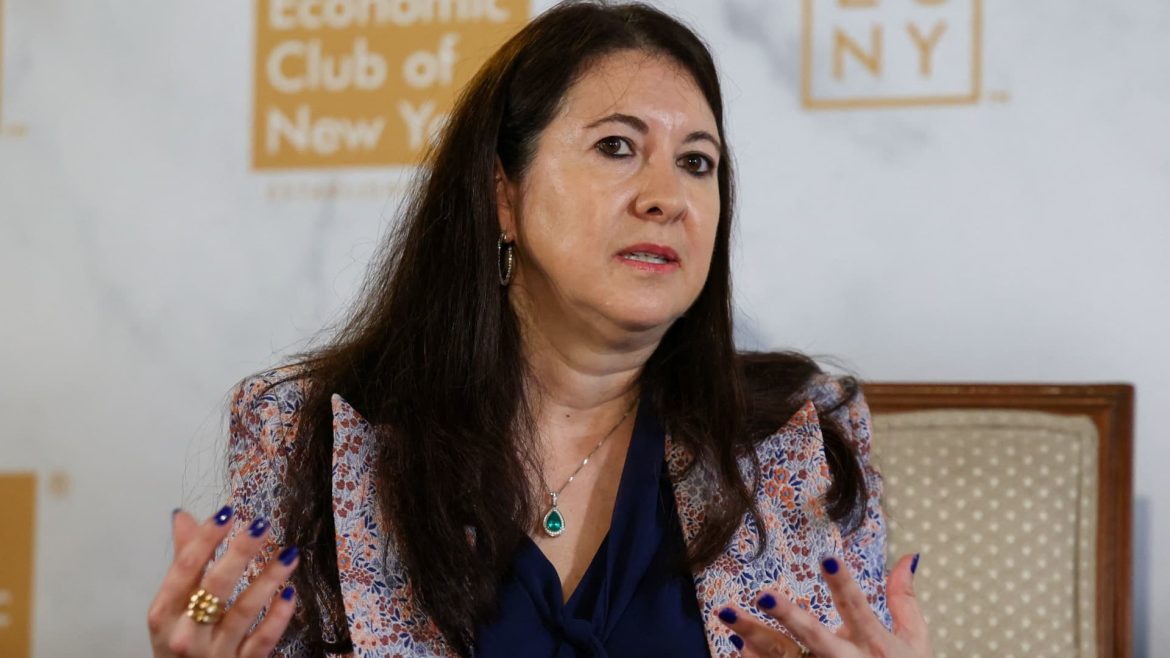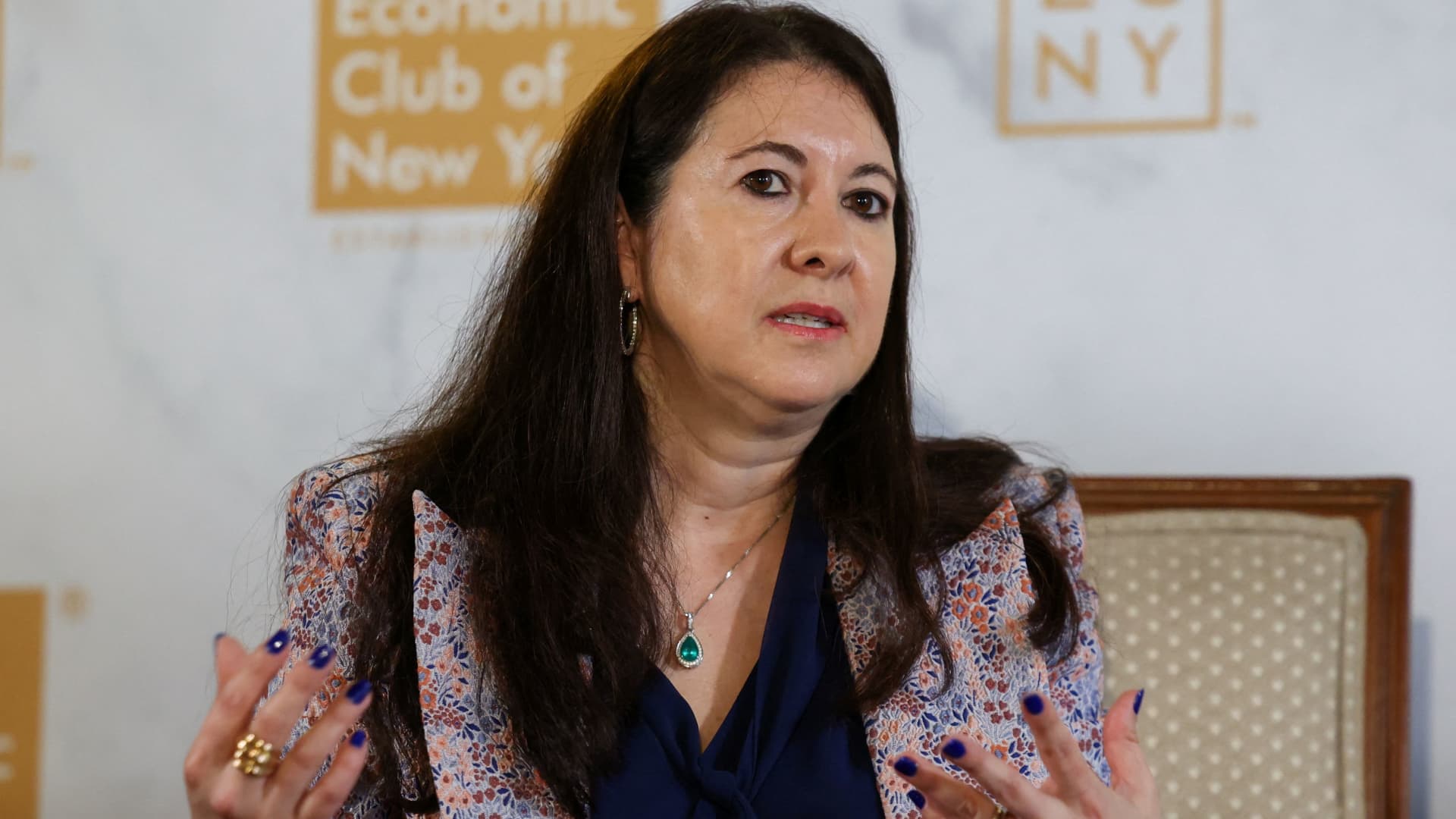The Unexpected Resignation of Fed Governor Adriana Kugler: Implications and Analysis
Introduction
The sudden resignation of Federal Reserve Governor Adriana Kugler, effective August 8th, has sparked a wave of speculation and analysis within financial and economic circles. Kugler’s departure, announced without a clear explanation, leaves a significant vacancy on the Fed’s Board of Governors, a body that plays a pivotal role in shaping U.S. monetary policy. This unexpected move comes at a time when the Federal Reserve is under intense scrutiny from the Trump administration, which has been vocal about its desire for lower interest rates. The implications of Kugler’s resignation extend beyond the immediate vacancy, touching on the broader dynamics of monetary policy, political influence, and economic stability.
Kugler’s Tenure and Contributions
Adriana Kugler’s tenure as a Federal Reserve Governor, though relatively brief, was marked by active engagement in key committees and a unique perspective shaped by her academic and professional background. Confirmed in September 2023, Kugler quickly became an influential voice within the Fed, participating in several critical committees, including the Committee on Financial Stability, the Committee on Federal Reserve Bank Affairs, and the Subcommittee on Smaller Regional and Community Banking. Her role as the Board’s representative to the Center for Latin American Monetary Studies underscored her expertise in international economics, a valuable asset in an increasingly interconnected global economy.
Kugler’s background as a labor economist and her tenure as a professor at Georgetown University brought a distinct focus on the intersection of monetary policy and employment. Her contributions to the Fed’s discussions likely emphasized the impact of monetary decisions on job creation, wage growth, and economic inequality. This perspective was particularly relevant in the current economic climate, where issues of income disparity and labor market dynamics are at the forefront of policy debates.
Reasons for Resignation
The official announcement of Kugler’s resignation did not provide specific reasons for her decision to step down. However, the timing and context suggest a confluence of factors that may have influenced her choice. The political climate surrounding the Federal Reserve, particularly the Trump administration’s persistent calls for lower interest rates, could have created an environment where Kugler felt her policy views were at odds with the administration’s expectations. This potential misalignment may have contributed to her decision to resign, especially given the Fed’s tradition of maintaining independence from political pressures.
Additionally, personal reasons or the allure of returning to academia may have played a role. Kugler’s decision to resume her position as a professor at Georgetown University indicates a possible desire to return to the academic world, where she can focus on research and teaching without the constraints of political scrutiny. The lack of a clear explanation from Kugler herself leaves room for speculation, but the combination of political pressures and personal considerations likely contributed to her resignation.
Impact on the Federal Reserve
Kugler’s departure creates a vacancy on the seven-member Board of Governors, a critical body that, along with the presidents of the 12 Federal Reserve Banks, forms the Federal Open Market Committee (FOMC). The FOMC is responsible for making key decisions about interest rates and other monetary policy tools, which have far-reaching implications for the U.S. economy. The vacancy left by Kugler will allow President Trump to nominate a replacement, potentially shifting the balance of power within the FOMC and influencing future monetary policy decisions.
The composition of the Board of Governors is crucial for maintaining the Fed’s independence and ensuring that monetary policy decisions are based on economic data rather than political considerations. Kugler’s resignation, coupled with the administration’s calls for lower interest rates, raises questions about the Fed’s ability to resist political pressures. The appointment of a new governor who aligns more closely with the administration’s views could lead to a more dovish approach, characterized by lower interest rates and a greater emphasis on economic growth, even at the risk of higher inflation.
Trump’s Opportunity to Reshape the Fed
President Trump’s ability to fill Kugler’s seat presents a significant opportunity to further shape the composition of the Federal Reserve. Throughout his presidency, Trump has been vocal about his dissatisfaction with the Fed’s interest rate policies, publicly calling for lower rates to stimulate economic growth. By appointing a governor who shares his views, Trump could exert greater influence over the Fed’s monetary policy decisions, potentially leading to a more accommodative stance.
However, the confirmation process for any nominee will be closely watched by financial markets and economists. The Senate must confirm the nominee, and any candidate whose views are considered too extreme or unconventional could face significant opposition. The political climate in Washington will play a crucial role in the outcome of the confirmation process, with Democrats and Republicans likely to clash over the nominee’s qualifications and policy preferences.
Potential Economic Consequences
The changes in the Federal Reserve’s board membership could have significant consequences for the U.S. economy. A more dovish Fed, influenced by Trump’s appointees, might be inclined to keep interest rates lower for longer, potentially boosting economic growth in the short term. Lower interest rates can stimulate investment, job creation, and consumer spending, providing a short-term economic boost. However, persistently low interest rates can also lead to unintended consequences, such as inflationary pressures, asset bubbles, and financial instability.
Inflation is a primary concern, as keeping interest rates too low for too long can erode the purchasing power of consumers and businesses. Asset bubbles, particularly in sectors like real estate and the stock market, can form when low interest rates encourage excessive risk-taking. Additionally, a prolonged period of low interest rates can create imbalances in the financial system, making it more vulnerable to shocks and crises.
Conversely, if the Fed maintains a more hawkish stance, prioritizing price stability over economic growth, it could risk slowing down the economy and potentially triggering a recession. Finding the right balance between these competing objectives is a crucial challenge for the Federal Reserve, especially in the current economic climate, where uncertainty and volatility are prevalent.
The Confirmation Process and Political Landscape
The Senate confirmation process for Kugler’s replacement will be a critical moment, with significant implications for the future of monetary policy. The process is likely to be contentious, with Democrats and Republicans potentially clashing over the nominee’s qualifications, views on monetary policy, and independence from political influence. The political climate in Washington will play a significant role in the outcome, with the Senate’s composition and the administration’s ability to secure support for the nominee being key factors.
If the Senate is closely divided, the nomination could face significant opposition, and President Trump may need to compromise to secure confirmation. The confirmation process will be closely watched by financial markets, as it provides insights into the future direction of the Fed and the broader economic landscape. The decisions made during this period will shape the economic landscape for years to come, highlighting the importance of maintaining the Fed’s independence and ensuring that monetary policy decisions are based on sound economic principles.
Conclusion: Navigating Uncertainties
The resignation of Fed Governor Adriana Kugler has introduced a new element of uncertainty into the economic landscape. President Trump’s opportunity to appoint a like-minded successor could significantly alter the direction of monetary policy, with potentially far-reaching consequences for the U.S. economy and global financial markets. The coming months will be critical as the nomination and confirmation process unfolds, with financial markets closely monitoring these developments for clues about the future path of interest rates and the overall health of the U.S. economy.
The ability of the Federal Reserve to maintain its independence, navigate political pressures, and make sound economic judgments will be crucial in ensuring stability and prosperity. The decisions made during this period will shape the economic landscape for years to come, underscoring the importance of balancing political considerations with economic realities. As the Fed navigates these uncertainties, the resilience and adaptability of the U.S. economy will be tested, highlighting the need for prudent and forward-thinking monetary policy.





